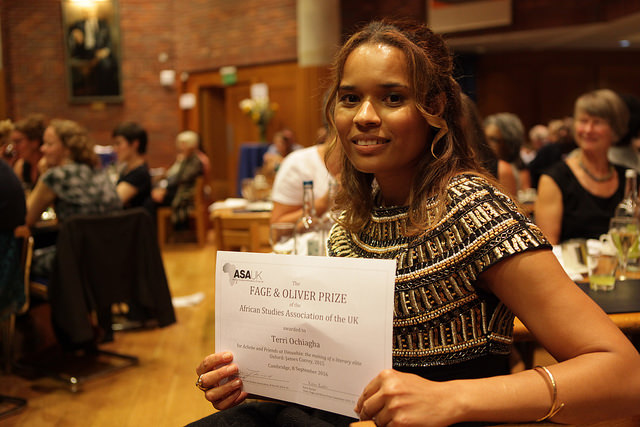- Atekmangoh, Christina: “Les Mbengis”-Migration, Gender, and Family: The Moral Economy of Transnational Cameroonian Migrants’ Remittances (Bamenda: Langaa RPCIG, 2017)
- Bamba, Abou B.: African Miracle, African Mirage: Transnational Politics and the Paradox of Modernization in Ivory Coast (Athens, O.H.: Ohio University Press, 2016)
- Lombard, Louisa: State of Rebellion: Violence and Intervention in the Central African Republic (London: Zed Books Ltd, 2016)
- Magaziner, Dan: The Art of Life in South Africa (Athens, O.H.: Ohio University Press, 2016)
- Ndeshi Namhila, Ellen: “Little Research Value”: African Estate Records and Colonial Gaps in a Post-Colonial National Archive(Basel: Basler Afrika Bibliographien, 2017)
- Nyamnjoh, Francis B.: #RhodesMustFall: Nibbling at Resilient Colonialism in South Africa (Bamenda: Langaa RPCIG, 2016)
- Richards, Paul: Ebola: How a People’s Science Helped End an Epidemic (London: Zed Books Ltd, 2016)
- Sylvanus, Nina: Patterns in Circulation: Cloth, Gender, and Materiality in West Africa (Chicago and London: University of Chicago Press, 2016)
John Donnelly Fage (1921-2002) and Roland Oliver (1923-2014) were pioneers of British African Studies. After a decade teaching in the University of the Gold Coast, Fage spent the rest of his career at Birmingham University where he founded the Centre for West African Studies (CWAS). With Oliver he founded The Journal of African History (1960). Oliver taught at the School of Oriental and African Studies (1948 -1986). He was one of the founders of the African Studies Association of the United Kingdom (1963) and played a major role in the establishment of the British Institute in Eastern Africa.
The winner of the inaugural Fage & Oliver Prize, for a book published in 2014 or 2015, was announced at the Biennial ASAUK Conference, held at the University of Cambridge, 7-9 September 2016.
In 2016 the two winners were:
Deborah James, Money from Nothing: indebtedness and aspiration in South Africa. Stanford, CA: Stanford University Press, 2015.
This timely, empirically rich, and theoretically innovative study explores the upsurge in consumer indebtedness, and its flipside, accessible credit in South Africa, following the post-1994 government’s initiative to abolish “credit apartheid” and “bank the unbanked”. It reveals a complex, contradictory and multi-faceted picture of ordinary people’s experiences of debt, and their efforts to keep a grip on expenditure while meeting family obligations and investing in a better future through education and training. It shows the significance of debt for a growing African middle class, and the complex forms that private ownership of property amongst African families has increasingly been taking. Based on original research, it is illuminated with captivating individual case studies while speaking authoritatively to a whole domain of comparative and theoretical work on popular economies, the formal and informal sectors, and the meaning of indebtedness.
Terri Ochiagha, Achebe and Friends at Umuahia: the making of a literary elite. Oxford: James Currey, 2015.
In this book, new light is shed on an iconic figure. In the last decades of colonial rule, Government College Umuahia in Eastern Nigeria produced an extraordinary cohort of creative writers – among them Chinua Achebe, doyen of African novelists. This study is an original exploration of the formation of this elite and the reasons for their adoption of fiction and poetry as their mode of expression. It traces the role of individual British teachers in their interactions with the young Nigerian writers-to-be, thus vividly illustrating the more culturally creative aspects of the colonial encounter. Ochiagha draws on interviews, memoirs and hitherto unknown archival sources, including school magazines, photographs and letters revealing the life and ethos of this prestigious school, to trace the emergence of a new literature. Elegantly written, this is a historical sociology of literature of a kind rare in African Studies.
Source: http://www.asauk.net/the-fage-and-oliver-prize/

